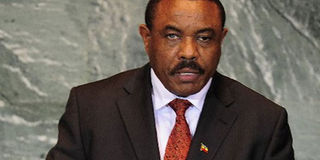Establish own media network, Africa urged

Ethiopian Prime Minister Hailemariam Desalegn has urged Africa to establish its own continental media network to counter the legacy of information dependency on the West. File
Africa should establish its own continental media network run by its own media professionals to counter the legacy of information dependency on the West, Ethiopian Prime Minister Hailemariam Desalegn has said.
“The African story needs to be accurately told in a way that reflects our challenges and aspirations,” Mr Hailemariam told the largest industry gathering of African media in Addis Ababa Thursday.
“By and large coverage of unfolding media events by the hegemonic world media has continued to be negative, with the continent written off at one time as a failed continent,” he told the African Media Leaders Forum (AMLF).
Mr Hailemariam said the narrative was now changing to one of Africa Rising, and called for the continental media to play a leading role in pushing this positive story, adding that the region could only be helped if it spoke with one voice.
“Ethiopia was once a symbol of everything that went wrong on the continent, but it has now changed that to one of the fast growing economies,” the prime minister said, attributing this to a focus on democracy and a new system of government that had recognised the central role of global and individual rights in development.
The AMLF annually collates the owners and operators of the region’s private media, and has been widely faulted for holding this year’s gathering in Ethiopia, which is often criticised by rights groups for what they say is a state-sanctioned policy of cracking down on individual freedoms.
Pressure group the Committee to Protect Journalists CPJ says that Ethiopia is the world’s second largest jailer of journalists, after Eritrea, and called on the media leaders to push for those held.
“The delegates should use the opportunity provided by this conference to highlight the plight of these persecuted journalists and to acknowledge media freedom is a cornerstone of Africa’s development,” CPJ’s Africa Program Coordinator Sue Valentine said in a statement.
But the forum organisers, the Nairobi-headquartered African Media Initiative (AMI), said that it was important to have a conversation with the country, instead of calls for boycott.
“We are in Ethiopia despite the heavy criticism we have faced, because we understand the African culture of dialogue,” Mr Ahmadou Mahtar Ba, the chief executive of AMI said, adding that the opening up of media space in many African countries is a process.
AMI said it was in high-level discussions with the leadership and had visited an Ethiopian prison to see the conditions that exist there.
“We are championing the search for a solution to the predicament of our colleagues,” Mr Ba said, adding that that a basis of mutual trust and confidence had been established.
Kenya President Uhuru Kenyatta is expected Friday to address the forum with media freedom expected to be on the agenda.
Kenya’s parliament recently passed a Bill that the country’s vibrant media industry has criticised as retrogressive, with the proposed law awaiting Mr Kenyatta’s action.
The AMLF is this year meeting under the theme of Media and African Renaissance, with a focus on improving the continent’s reporting.




